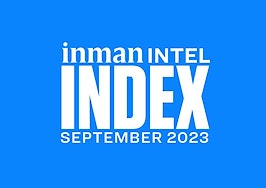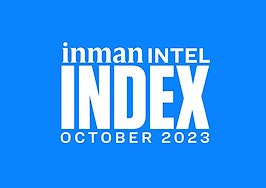No one can predict the future of real estate, but you can prepare. Find out what to prepare for and pick up the tools you’ll need at Virtual Inman Connect on Nov. 1-2, 2023. And don’t miss Inman Connect New York on Jan. 23-25, 2024, where AI, capital and more will be center stage. Bet big on the future and join us at Connect.
A majority of real estate agents say old-school networking has provided the best return on investment in terms of time and money over the past 12 months, according to exclusive results from the inaugural Inman Intel Index.
SHARE YOUR EXPERTISE: TAKE THE INMAN INTEL INDEX SURVEY
Agents reached a strong and clear majority consensus on which tactic has created the best bang for their buck in this down market. Nearly 53 percent of respondents said that old-school networking has the best return on their time and money investment today, compared to 16 percent who reported that social media provided the best ROI and 7 percent who said buying leads and lead generation software provided the best return.
“Today’s agent is dealing with a lot of noise and negativity, but I think these findings suggest most aren’t looking for any port in the storm,” Inman Director of Research Chris LeBarton said. “They want to go back to the bedrock of the industry, which is the people they know and those who can help make connections.”
Looking ahead to the next 12 months, a large share of agents plan to double down on their networking activities, with 41 percent reporting plans to increase their time and money investment in networking within the next year. Comparatively, 31 percent of agents plan to increase their investment in social media, 10 percent their investment in open houses, 9 percent their investment in buying leads or lead-gen software, and 9 percent an investment in other areas.
Though it’s hard to know for certain, the forward-looking focus agents seem to be shifting toward social media in the next year may suggest that, while networking has proven to have a good ROI in recent months, some agents may feel maxed-out on networking. Agents may also feel that social media is an area with more potential to grow their business in the months ahead.
The Index, also known as the Triple-I, is sent out monthly to the Inman community. The first-ever Triple-I survey was conducted from Sept. 23 to Oct. 1, 2023, and received a total of 397 responses. Respondents came from groups of residential real estate agents, mortgage brokers and bankers, corporate executives, investors, proptech founders and more. The complete results of the Triple-I survey are available to Inman Intel subscribers.
In addition to the value placed on old-school networking, here are a few other big takeaways from the inaugural Inman Intel Index survey.
The buyer pipeline challenge

For months, the narrative of the market’s struggles has largely revolved around homesellers being unwilling to move because they’re reluctant to let go of their 2 percent, 3 percent or 4 percent mortgage rates, and are concerned about the lack of inventory.
However, agents who responded to the Triple-I said that it’s buyers, these days, whom the agents struggle to bring to the transaction. Thirty-seven percent of agents said their buyer pipeline is “substantially lighter” than it was 12 months ago. Still, looking ahead to the next 12 months, some agents are cautiously optimistic, with 35.2 percent saying they expect their buyer pipeline to remain the same, and 30.7 percent saying they expect that pipeline to become heavier. Another 18.3 percent expect that pipeline to become lighter and 12.4 percent expect it to become “substantially lighter.”
“Experts can say whatever they want, but buyers are gold,” right now, one agent respondent said.
A sea change in hiring optimism

As the market began to teeter and slow towards the end of 2022, rounds of layoffs started to return at real estate companies in a way that hadn’t been seen since the start of the pandemic. Major companies like Realtor.com, Anywhere, RE/MAX, Redfin and more issued layoffs in an effort to cut costs and improve their bottom line.
But Intel’s recent survey shows that cost-cutting attitude may be shifting in a big way. While 27 percent of business leaders surveyed said their headcount declined in the last 12 months, just 9 percent expect to have to cut staff over the course of the next year. Meanwhile, 44 percent of leaders expect their headcount to remain the same in the next 12 months, and a significant 46 percent expect their numbers to grow.
Eyes shift to big changes in regulation

Another topic real estate executives are turning their eyes towards as the commission lawsuits and trials play out is the changing face of industry regulation.
Although interest rates remain a major source of business disruption, the potentially industry-shaking regulation changes to come in the wake of Sitzer | Burnett are causing these issues to become a growing concern. Just 5.5 percent of executives said regulation was a concern for their business today, but 15.7 percent expect it to become the most challenging part of the business environment 12 months from now.
LeBarton said he would not be surprised if the concern over regulation becomes even greater in upcoming months as developments with the lawsuits come forth.
“This industry is changing — right now,” LeBarton said. “Twelve months ago, there were far fewer people in the industry who were even aware of the lawsuits. Inman’s tracked that. Now, our readership has it in their faces. Their business leaders are talking about it. They’re preparing them for eventualities.”
Inman’s second monthly Inman Intel Index survey is now live and open for submissions.









